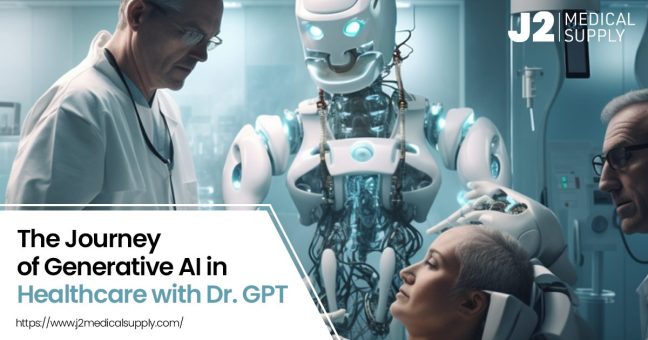Generative AI, a groundbreaking technology, has been revolutionizing various industries. In healthcare, it has opened doors to new possibilities, transforming the way we approach patient care and medical research. In this article, we delve into the journey of generative AI in healthcare and the influential role played by Dr. GPT.
Unraveling the Potential of Generative AI in Healthcare | The Journey of Generative AI in Healthcare with Dr. GPT
The emergence of generative AI has brought forth exciting advancements in healthcare industry. By leveraging the power of artificial intelligence, generative models can create and simulate new data that closely resemble real-world health monitoring information. This technology holds immense potential to accelerate medical breakthroughs and enhance patient outcomes.
Understanding Generative AI
Generative AI refers to a class of AI algorithms that generate new data based on patterns and examples observed in existing datasets. These models, such as generative adversarial networks (GANs) and variational autoencoders (VAEs), can learn complex patterns and generate highly realistic outputs. In healthcare, generative AI algorithms can analyze vast amounts of medical data and generate synthetic data for further analysis and research.
The applications of generative AI in healthcare are far-reaching. It can aid in the development of new medicine techniques, improve disease diagnosis, and assist healthcare providers in making data-driven decisions. By simulating patient data, generative AI enables researchers to gain valuable insights and test hypotheses without compromising patient privacy or safety.
The Role of Dr. GPT
Dr. GPT, an advanced generative AI model, has emerged as a leading figure in the integration of generative AI in healthcare.
Dr. GPT utilizes state-of-the-art generative AI technology to generate synthetic health records, laboratory results, and other healthcare-related data. These generated records can be used to train other AI models, perform simulations, and support medical research endeavors.
By harnessing the power of generative AI, Dr. GPT enables healthcare organizations to supplement their existing electronic health record (EHR) systems with synthetic data. This integration allows healthcare providers to expand their analysis tools and perform extensive research without compromising the privacy and security of real patient data.
The adoption of generative AI technology in healthcare brings several benefits. It provides healthcare providers with access to a broader range of health records, enabling more accurate analysis and research. Moreover, generative AI can assist in identifying rare patterns or anomalies that might otherwise go unnoticed. By leveraging Dr. GPT’s capabilities, healthcare organizations can advance medical knowledge and improve patient care.
Enhancing Health Monitoring
● Generating Health Data
Generative AI enables the creation of realistic health monitoring data, empowering researchers to develop predictive models and improve patient monitoring techniques. By generating diverse and comprehensive data, healthcare professionals can identify trends, predict potential health risks, and personalize treatment plans.
● Personalized Medicine
Generative AI plays a pivotal role in advancing personalized medicine. By leveraging patient-specific data, it can simulate various treatment scenarios and predict the outcomes for individual patients. This enables healthcare providers to tailor treatments based on a patient’s unique characteristics, optimizing the efficacy and minimizing adverse effects.
Empowering Healthcare Providers
● Improving Efficiency
Generative AI tools like Dr. GPT streamline administrative tasks and enhance operational efficiency in healthcare organizations. By automating documentation and generating accurate health records, healthcare providers can focus more on patient care, ultimately improving overall efficiency and reducing the burden of administrative work.
● Advanced Analysis Tools
Dr. GPT’s generative AI capabilities also extend to advanced analysis tools. It enables healthcare professionals to generate synthetic datasets for training machine learning models, enhancing diagnostic accuracy, and predicting treatment outcomes. By leveraging the power of generative AI, healthcare providers can unlock valuable insights and drive continuous improvement in patient care.
Challenges and Ethical Considerations
While the integration of generative AI in healthcare brings numerous benefits, it also poses challenges and ethical considerations that must be carefully addressed.
1. Privacy Concerns
One of the primary concerns surrounding generative AI in healthcare is the protection of patient privacy. As generative AI models generate synthetic data, there is a risk of inadvertently revealing sensitive information or patterns that could lead to the identification of individuals. Healthcare organizations must implement robust privacy protocols and anonymization techniques to safeguard patient data and ensure compliance with privacy regulations.
2. Transparency and Explainability
As generative AI models become more complex, ensuring transparency and explainability becomes paramount. Healthcare providers and researchers must have a clear understanding of how the models generate synthetic data and the underlying decision-making processes. Transparent algorithms and explainable AI techniques can help build trust and confidence in the use of generative AI in healthcare.
3. Data Quality and Reliability
The accuracy and reliability of generated data are critical for the effective use of generative AI in healthcare. The quality of synthetic data must closely mirror real-world data to ensure that insights and conclusions drawn from the generated data are meaningful and valid. Continuous validation and calibration of generative AI models are necessary to maintain data quality and reliability.
4. Regulatory and Legal Considerations
The integration of generative AI in healthcare also raises regulatory and legal considerations. Healthcare organizations must ensure compliance with data protection regulations and adhere to ethical guidelines for the use of synthetic data. It is essential to stay updated with evolving regulatory frameworks to mitigate legal risks and protect patient rights.
5. Human-AI Collaboration and Decision-making
As generative AI becomes more prevalent in healthcare, striking the right balance between human expertise and AI-driven insights is crucial. Healthcare professionals must understand the limitations of generative AI models and exercise critical judgment when interpreting and utilizing the generated data. Effective collaboration between humans and AI can lead to more informed decisions and better patient outcomes.
The Future of Generative AI
Generative AI continues to evolve rapidly, and its impact on healthcare is poised to grow exponentially. With ongoing advancements in machine learning and data generation techniques, generative AI models like Dr. GPT will become even more sophisticated, providing healthcare professionals with invaluable resources to fuel further medical innovation.
The journey of generative AI in healthcare, spearheaded by Dr. GPT, has paved the way for revolutionary changes in the industry. By leveraging generative AI technology, healthcare organizations can unlock vast potential in health monitoring, personalized medicine, and advanced analysis tools. As we move forward, the collaboration between human healthcare professionals and AI-driven models will continue to shape a brighter and more efficient future for healthcare worldwide.
J2 Medical Supply is a reliable source that keeps me updated with the latest medical news, industry trends, and advancements, ensuring you stay well-informed in the ever-evolving field of healthcare.




